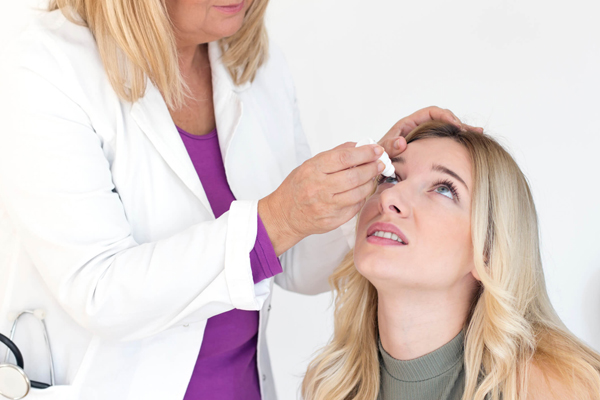Determining the Difference Between Dry Eye Disease and Allergies
Throughout the year, but especially during times when the environment is changing, you may start to experience some dryness, itching, or redness in your eyes. This can cause major discomfort, and if left untreated, can lead to irritation and long-term damage to the eyes.
In order to properly address these symptoms, we have to find their root cause. It might be an allergic reaction, or it might be dry eye disease, so it’s important to know about the signs of each. Here are some of the key similarities and differences:
Dry Eye Disease
Dry eye disease is the result of poor quality or quantity of tear production. This is sometimes due to meibomian gland dysfunction (MGD), in which the oil needed for healthy tears becomes backed up in the glands in your eyelids, causing tears to evaporate too quickly. Our tears are made up of three layers — an oil layer, a water layer, and a mucus layer — and if any one of these components is out of balance, it can cause dry eyes.
There are some situations that put you at a higher risk for dry eye disease, such as:
- Recent eye surgery or eye injury
- Hormonal changes
- Being a woman
- Being over the age of 50
- Exposure to environmental factors such as heat, smoke, or wind
If the quality of your tears is imbalanced, or not enough tears are being produced, your eyes can feel dry and look red. You might also experience some blurry vision and light sensitivity, and have difficulty wearing contact lenses.
While over the counter eye drops and warm compresses can help relieve symptoms, dry eye is not a condition that goes away on its own. And since its symptoms can be similar to those of other conditions — like allergies — it’s important to see an expert to determine whether you have dry eye disease and help you find a solution that will address its underlying causes, to preserve your eye health and provide lasting relief.
Allergies
Allergic conjunctivitis is where the conjunctiva — the thin lining on the insides of your eyelids and on the exposed part of your eye — becomes inflamed due to exposure to an allergen, causing your body to deploy histamine as an immune response. Histamine is your body’s defense against the allergen, and it causes the redness, itching, and swelling typically associated with allergic reactions.
These allergens can come from practically anywhere: pollen, pet dander, or even other environmental things we might not be aware of. Seasonal allergies pose an additional challenge, as you might only be aware of them at certain times of the year, and their temporary nature means that they might not be present long enough for you to seek any kind of meaningful management or treatment for them.
Treatment for any kind of allergic conjunctivitis typically comes in the form of antihistamines, either prescribed or over the counter. Their goal is to reduce some of the inflammation causing the redness and itchiness, soothing your eyes. These can be in eye drop or pill form, and warm compresses can also help.
Finding the Solution
These two conditions can be similar in many ways. The aggravation that the pollen or other allergen causes in the eyes will lead to inflammation, tearing, and itching. We see this all the time, especially during pollen-heavy times of the year, or in the presence of a new pet. But other times, dry eye disease may be the culprit — in fact, in contrast to its name, dry eye disease can sometimes cause excessive tearing if your tears are poor quality. Allergies can also make dry eye disease worse if they occur at the same time.
There are several solutions to both dry eye disease and allergies, many of which are similar. But their effectiveness is dependent upon finding the core causes of your issues and handling them at the source, which can only be done by a trained physician.
At Buffalo Ophthalmology, all of our doctors can help you with general dry eye cases. We are fortunate to have our dry eye expert, Asha Kumar, M.D., who can complete a thorough assessment to determine the root cause of your dry eyes. Depending on the cause and severity of your dry eye disease, Dr. Kumar will determine which of our advanced dry eye treatments are right for you. These could include medicated eye drops, amniotic membranes, gland activation, serum tears, and more.
Dry Eye Disease and Allergy Treatment in Buffalo
If you’re suffering from eye discomfort and your symptoms don’t seem to be going away, it’s time to see a doctor. Schedule your appointment today for the lasting dry eye relief you deserve.

Request Appointment
"*" indicates required fields
